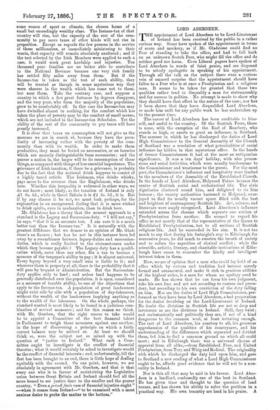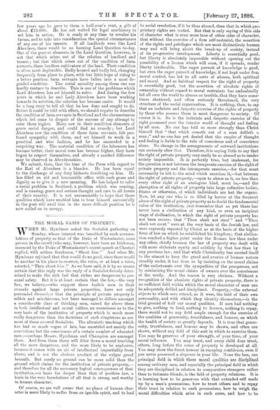LORD ABERDEEN.
THE appointment of Lord Aberdeen to be Lord-Lieutenant of Ireland has been received by the public in a rather curious way. Some have spoken of the appointment in terms of scorn and mockery, as if Mr. Gladstone could find no Peer of standing to take the office, and had to fall back on an unknown Scotch Peer, who might fill the office and do neither good nor harm. Even Liberal papers have spoken of Lord Aberdeen in words of faint praise, and are disposed to be utterly apologetic in speaking of his appointment. Through all the talk on the subject there runs a curious vein of amused surprise that the appointment should have fallen to a Peer who is at once a Presbyterian and a religious man. It seems to be taken for granted that these two qualities rather tend to disqualify a man for statesmanship and for success in politics. No attempt is made to show why they should have that effect in the nature of the case ; nor has it been shown that they have disqualified Lord Aberdeen, or made him unfit for any public work he has undertaken up to the present time.
The career of Lord Aberdeen has been creditable to him- self, and useful to the country. Of the Scottish Peers, there is none, with the exception of the Earl of Rosebery, who stands so high, or exerts so great an influence, in Scotland. The manner in which he has discharged the duties of Lord High Commissioner to the General Assembly of the Church of Scotland was a revelation of what potentialities of social influence lay hidden in that mysterious office. In the hands of former Commissioners, it had at the most an antiquarian significance. It was a ten days' holiday, with nice proces- sions and social festivities, which were usually burdensome to the Commissioner and wearisome to the guests. For the most part, the Commissioner's influence and hospitality were limited to the members of the Assembly of the Established Church. In the hands of Lord Aberdeen, Holyrood Palace became the centre of Scottish social and ecclesiastical life. The civic dignitaries clustered round him, and delighted to do him honour ; the county authorities hastened to Holyrood, over- joyed to find its usually vacant space filled with the best and brightest of contemporary Scottish life. Art, science, and literature were amply recognised. Lord Aberdeen's influence extended across the chasms which separate one section of Presbyterianism from another. He seemed to regard his office as not merely that of the representative of the Queen to Established Presbyterianism, but to all sections of Scottish religious life. And he succeeded in his aim. It is not too much to say that during his fortnight's stay in Edinburgh for successive years, he did much to sweeten the breath of society and to soften the asperities of clerical conflict ; while the scientific, artistic, literary, and charitable institutions of Edin- burgh have cause to remember the kindly and intelligent interest taken in them.
Now, we are of opinion that a man who could lay hold of an office which by custom and tradition had become merely formal and ornamental, and make it rich in gracious utilities of the highest order, is a man for whom no apology need be made. He has shown that he can form his own judgment, take his own line, and act not according to custom and prece- dent, but according to his own conviction of the duty falling on him. Nor are the duties of Lord High Commissioner, per- formed as they have been by Lord Aberdeen, a bad preparation for the duties devolving on the Lord-Lieutenant of Ireland. No doubt the divisions in Scottish life are not so deep and inveterate as are the divisions in Ireland. Still, they exist ; and ecclesiastically and politically they are, if not of a kind dangerous to the common weal, at least irritating enough. The tact of Lord Aberdeen, his courtesy to all, his generous apprehension of the qualities of his countrymen, and his understanding of the differences which separated and divided them, led him to find a common ground on which all could meet ; and in Edinburgh there was a universal chorus of approval from all alike,—from Established, Free, and United Presbyterian, from Tory and Whig and Radical. The originality with which he discharged the duty laid upon him, and gave to Scotland a new reading of what a Lord High Commissioner ought to be, affords good evidence that he will not be a non- entity in Ireland.
Nor is this all that may be said in his favour. Lord Aber- deen is a landlord, confessedly one of the best in Scotland. He has given time and thought to the question of land tenure, and has shown his ability to solve the problem in a practical way. His own tenantry are loud in his praise. A few years ago he gave to them a half-year's rent, a gift of about £15,000. He has not waited for legal machinery to set him in action. He is ready at any time to revalue his farms, and to take into consideration the special circumstances of any one of his tenants. If all landlords were like Lord Aberdeen, there would be no burning Land Question to-day. One of the gravest elements in the Land Question, however, is not that which arises out of the relation of landlord and tenant ; but that which arises out of the condition of farm servants, those landless cultivators of the land. Their condition is often most deplorable. Badly housed and badly fed, changing frequently from place to place, with but little hope of rising to a better position. farm servants have fallen into a most de- graded condition. The social morality among them one can hardly venture to describe. This is one of the problems which Lord Aberdeen has set himself to solve. And during the few years in which he and Lady Aberdeen have been working towards its solution, the solution has become easier. It would be a long story to tell all that he has done and sought to do. Before it could be told with effect, we should require to describe the condition of farm servants in Scotland and the circumstances which led some to despair of the success of any attempt to raise them higher. Many saw in their condition elements of grave social danger, and could find no remedy ; but Lord Aberdeen saw the condition of these farm servants, felt pro- found sympathy with them, and set himself to work in a practical and wise fashion, and he has succeeded in a surprising way. The material condition of the labourers has become better, their moral tone has become higher, they have began to respect themselves, and already a marked difference may be observed in Aberdeenshire.
We submit, then, that the tone of the Press with regard to the Earl of Aberdeen is a blunder. He has been equal to the discharge of any duty hitherto devolving on him. He has filled an old and honourable office with such grace and dignity as to give it a new meaning. He has helped to solve a social problem in Scotland, a problem which was causing, and is causing, grave and serious thought and care to all lovers of their country. It is not unreasonable to hope that those qualities which have enabled him to bear himself successfully in the past will avail him in the more difficult position he is now called on to occupy.



































 Previous page
Previous page